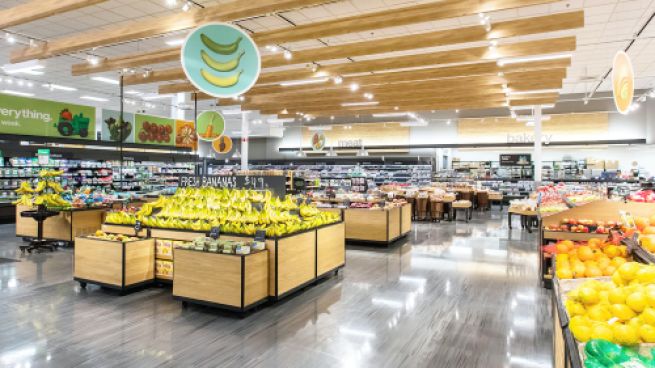Target Gets Serious About Grocery

“We’ve also launched meal solutions, which is a meal in a bag for under $15,” Gomez says. “They’re great recipes like sesame teriyaki chicken stir-fry. It’s really good, and they’re really easy to make. But what our guests are saying with Good & Gather is they love newness.”
The retailer plans to launch hundreds of new Good & Gather items this fall.
“My favorite one is a frozen flatbread with arugula and prosciutto, and it comes with a balsamic vinegar drizzle on top once it’s baked,” Gomez says. “We’re going to continue to innovate on that platform and continue to bring new items under the Good & Gather brand. There’s a lot of runway for all the brands.”
Good & Gather joins other new owned brands such as the indulgence-oriented Favorite Day (items priced under $15), Favorite Day Gourmet, and Kindfull, a pet product line. Favorite Day has more than 700 items, while Kindfull features more than 50 items. Gomez says that the company is launching dozens of new items this fall under the Favorite Day brand.
“We have an outstanding sourcing team, and we have outstanding packaging, graphics and marketing teams,” Gomez notes. “When these products launch, they are, to me, the epitome of ‘Tarjay.’ They’re stylish, they’re on trend, and they’re affordable.”
Of course, providing an elevated grocery experience requires specialized team members to merchandise the retailer’s food and beverage departments, and that’s why the company has brought in a growing squad of what it calls food and beverage coordinators.
“Our food and beverage coordinators are a game-changer for Target,” Gomez says. “They bring food and beverage expertise and knowledge, but even more than that, they bring food and beverage passion. Some of them are internal hires. Some of them are external hires. Many of them oversee a handful of stores, and they are partnering with that store, helping them understand how to manage and grow a food and beverage business. They bring a tremendous amount of expertise.”
In September, the retailer, which has about 350,000 employees who are trained to provide an elevated service experience, said that it plans to hire more than 100,000 seasonal workers for the holidays and give current employees more hours. Target, which permanently raised its starting wage to $15 an hour last year, is also offering employees debt-free college tuition programs, among other benefits.
An Omnichannel Strategy That Clicks
Target’s strategic thinking led the company to invest in omnichannel optimization long before COVID-19, and that strategy has paid off in spades over the past year. Target was ready when the pandemic hit and e-commerce demand accelerated, with the majority of its food and beverage assortment available via several contactless pickup services.
“Prior to the pandemic, we were making investments in our same-day services,” Gomez observes. “When the pandemic hit, we were set up to deliver on our guests’ needs to create a safe and easy shopping experience.”
In August, the retailer said that its Q2 sales grew 9.5% to $25.2 billion, while comps increased 8.9% and digital comps jumped 10%, building on record growth of 195% last year. Target’s digital channel is led by same-day services such as Order Pickup, Drive Up and Target-owned Shipt, which together have grown 55% this year, on top of more than 270% last year. Target specifically credited Drive Up with double-digit growth in its fresh categories in the second quarter.
This spring, Target expanded its same-day service assortment to include adult beverage items at more than 1,200 of its stores across the country.
“We’re winning in digital because we don’t force our guests to shop on Target’s terms; instead, Target serves guests on their terms,” Gomez says. “There’s no minimum order requirement, no arbitrary pickup times, and when you click ‘I’m here in the parking lot,’ we’ll see you in two minutes or less — it’s that easy.”
Target’s online investments haven’t come at the expense of physical stores, however, which remain an integral part of the retailer’s strategy. In fact, Target says that digital engagement drives more engagement in stores, providing more opportunities to surprise, delight and inspire guests.
“That frictionless experience is why we continue to grow our digital business,” Gomez insists. “Even as guests are also shopping in-store, more often Drive Up is one of the most popular services. We’re just becoming an easier place to shop.”
Following a pandemic pause on store openings last year, the company still managed to remodel more than 130 stores and open 30 new stores in 2020. This year, Target aims to complete about 140 remodels and open as many as 40 new stores. After experimenting over the years with various large and small formats, the retailer has adopted a more localized strategy, ranging from a planned 132,000-square-foot store in Yonkers, N.Y., to a planned 12,000-square-foot store in Ann Arbor, Mich.
To add capacity to Target’s fulfillment operation and further scale its stores-as-hubs model, the company opened two new distribution centers this year and has signed leases for four more “sortation” centers. These facilities collect online orders from local stores various times a day and sort them into efficient routes for carrier delivery. This pulls the sorting activity out of store back rooms so it can be consolidated more efficiently at one facility, giving store teams more time and space to fulfill additional orders, while reducing the load on external carriers. This process increases store fulfillment capacity and speeds delivery to guests, making it pivotal to the Target value proposition.
“We recognize there’s plenty of work in front of us,” Gomez admits. “We’re definitely in the midst of this journey, but our food and beverage business has a ton of momentum right now, and our team is not resting on our laurels. We are committed to rewarding the trust our guests have placed in us by raising the bar on ourselves, so that we can deliver an experience that only gets better and better.”
progressivegrocer.com

